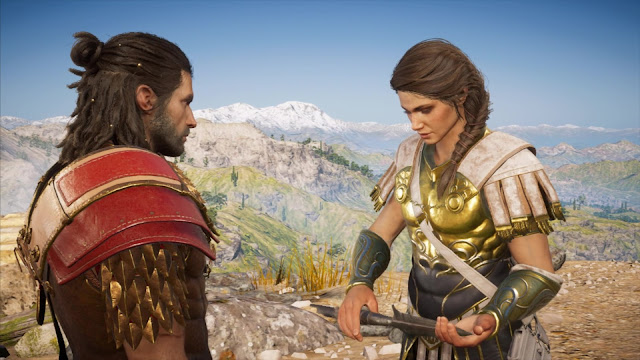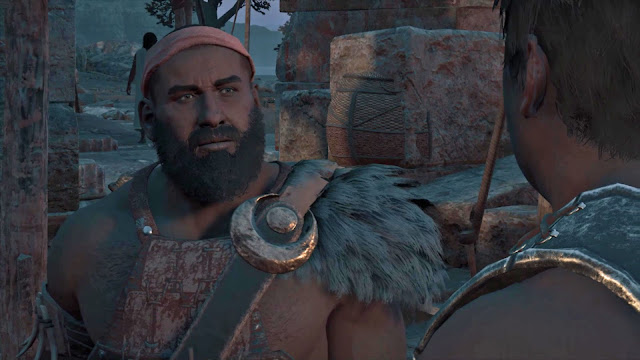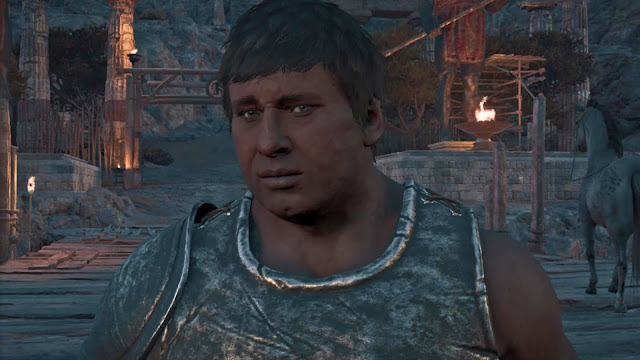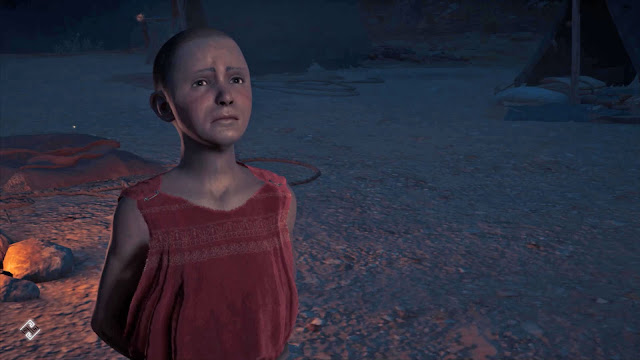One of the many prominent themes in the story of Assassin's Creed Odyssey is family connections, and especially the usually complicated relationships between siblings. This is an issue that dominates throughout the plot, since the lead character has a biological sibling who at least for the most part of the story is also their archenemy, and they also discover a foster brother, a young man whom their father adopted as a boy years before, after his original family was presumably lost. But apart from the protagonist's case and their relationship with their siblings, there are also many stories and substories in the game that either are centered around other siblings or their development depends a lot on the bonds that connect them or not.
Keep in mind that most of the stories mentioned in this article may play out differently depending on the choices you make. My analysis is based on the choices that I usually make in my playthroughs, which I feel they make more sense. Still, although the outcomes may differ, the basic emotional and intellectual traits of the characters always remain the same, with minor variations.
Good and Evil as opposing forces
Alexios and Kassandra
Although not entirely unerring himself, since there are instances where he may be unjust or even cruel, Alexios is a good-hearted, well-balanced and insightful hero with foresight and high perception. Kassandra, on the other hand, having grown up in the care of the Cult of Kosmos, reached a point where she was brainwashed almost without hope of recovering. Chrysis, the priestess who took care of her, taught her from a very tender age to be cruel and ruthless and use her supreme power in all the wrong and evil ways. Her moniker, Deimos, pretty much sums up her mentality, her superhuman strength and the fear that she inflicts on others, since it means "terror".
We can see, however, when in the good ending of the game she is brought back to her senses and becomes her real self again, that she does have some good elements which, undoubtedly, will be cultivated further if she ends up with her family reunited. The relationship between Alexios and Kassandra is not that much complex, because they did not grow up together as siblings and in reality they hardly know each other, especially as far as Kassandra is concerned because she was only a baby when she was violently separated from her family. Still, the power of her bloodline never ceased to be there and it almost literally "speaks" to her when Alexios offers her to hold his spear.
Agapios and Neritos
Diona and Eritha
Diona
is one of the most memorable female Cultists that you come across, what
with her seductive manner and her cunning, and she is also one of the
most interesting characters in the game overall. She and her twin sister Eritha are identical in appearance, but quite different when it comes to psyche, mentality and ethics. Alexios first comes across Diona, who is a priestess of Aphrodite on the island of Kythera and initially appears as an innocent damsel in distress, claiming that there are criminals in the region who are threatening her life. Alexios begins his investigation on Kythera, where things are not exactly what they seem and of course not at all how Diona paints them.
As the story unfolds, Alexios finds out that Diona's sister is the High Priestess, a person far more esteemed and prestigious than herself, and the two also happen to be identical twins. Diona however hates Eritha because the latter had always been one step ahead of her, always better in everything, and her venomous jealousy led her to become a member of the Cult of Kosmos, in an attempt to claim her own place in the world and gain absolute power. As a villain, Diona is a very interesting character because she is evil incarnate in a way far more deep and complex than Kassandra whose extremely violent behaviour is mainly a result of brainwashing. Diona is one hundred percent conscious of her actions, and there is no way she can possibly change. Eritha, on the other hand, is a just person in general, but has her own fair share of cruelty as it is implied that she punishes people who don't show enough faith. But we could say that this is part of her role as a High Priestess, which more often than not demands from her to be severe.
While Eritha cares for Diona, Diona is ruthless and determined to kill her sister in cold blood, but during their final confrontation, they both seem to share almost the same amount of hatred for each other. Good and evil in this case reach a point where they nearly overlap, an indication that everything in this life is fluid, even moral values.
Herodotos and Mestor
Mestor is Herodotos's adopted brother, who seems to be gentle and kind-hearted at first, but as it turns out he has a very dark side which led him to betray his homeland and his family. When Herodotos reunites with his brothers on the island of Samos, Mestor is the one to welcome him with open arms, seemingly overwhelmed with happiness for his return. This comes to contrast with the contempt and anger with which Theodoros, Herodotos's biological brother, reacts upon his arrival, creating a false impression about the inner motives of each character.
In the course of the story, Alexios comes across a surprise when he bumps onto Stentor, a young soldier whom his father adopted when he was just a boy, after losing his original family. Stentor may be stubborn and egocentric and hate Alexios with a venom at the beginning, yet he adores his stepfather and this is something that counts a lot for him, as it apparently happens to be his weak spot.
During a most crucial confrontation between him and Alexios, their father's unexpected appearance and his words towards Stentor are enough to make him have a change of heart and potentially bring out his better self. Alexios on the other hand does look like he feels a bit sorry for Stentor, as in some way he kind of understands his reactions, and is ready to give reconciliation a chance when the time comes. Both Alexios and Stentor have a deep and strong sense of duty, but their perception of it is quite different: Stentor is blindly faithful to his duty and he refuses to be a bit more flexible and open his mind, while for Alexios, duty is not strictly one thing, as what he has to do every time depends a lot on several other factors that he always takes into consideration before taking action.
Lykaon and Agave
Lykaon is the physician whom you meet in the Chora of Delphi, and he looks like a sweet and kind young man who cares for his patients and people in general. Lykaon is good-mannered and gentle and he seems to be very sentimental and sensitive, which makes the situation where he finds himself rather tough. His grandmother, Praxithea, used to be an oracle at Delphi in her youth, and was one of the series of eloquent women that the Cult had "prophesying" exactly what they ordered, making people believe that it was actually the gods that spoke through her. From her position as an oracle, Praxithea was forced to give false prophecies for years, endangering and dooming many people all over Greece. Having discovered this, Lykaon is unable to find peace and he feels that his duty is to kill his grandmother in order to restore justice. But because he is a good person, he finds it extremely difficult to commit murder, and decides to kill Praxithea peacefully by giving her a large dose of mandrake, otherwise a medicinal plant but a poison when given in big quantities, so that he can do his duty and not have too much remorse about it. Still, as the time approaches for the deed to be done, he feels less and less inclined to proceed and asks Alexios for moral support. In a twist of the story, however, it is revealed that Praxithea was in fact the oracle who gave Alexios's
family the fatal prophecy about Kassandra's god-requested execution years ago, a revelation that unavoidably has Alexios get much more personally involved in the case.
While Lykaon has to fight with his own conscience and finds it rather hard to bring himself together and do what he thinks is morally just, his sister Agave has a quite different perception of how all this should be dealt with. She too feels that their grandmother had done wrong and should be punished somehow, but she does not want to let Lykaon get blood on his hands. When bandits hired by the Cult of Kosmos arrive to kidnap Praxithea in order to kill her later, Agave does nothing to stop them and even allows them to take her away, because she feels this is the perfect chance for her and Lykaon to get rid of their grandmother without having to resort to something nasty themselves. Agave's reactions are a bit contradicting, though; on the one hand she refuses to let Lykaon become a murderer, but on the other she doesn't seem to have the slightest regret for literally sending Praxithea to her death. Although she never considered harming her grandmother herself, she feels relieved when someone else unexpectedly releases her from the burden of having to do something about it. Whereas Lykaon feels guilty even before attempting to commit murder, and when finally Praxithea is free and Alexios prevents him from killing her, he is relieved and makes peace with his conscience and his life.
Victims of circumstance
Tekton and his unnamed brother
Tekton is a young man whom you meet early in the story; he is stranded on a wrecked boat off the coast of Boeotia near a deserted island, and he asks you to go free his brother who had been captured by pirates and is held on another island nearby. Both Tekton and his brother are carpenters, and the brother especially never really liked the sea, but he had reluctantly accepted to take that trip with Tekton. The story does not end well for the two brothers, although Alexios manages to locate and free the captured one after killing his abductors. Unfortunately, he is already too exhausted and weak to be able to survive, and he dies minutes after he is set free.
Ankos and Araxis
Davos and Orneos
The
case of these two brothers is quite unique, as they do seem to share a
holy bond, but the interactions both between them and with Alexios are
not exactly indicative of that. Alexios first comes across Davos on the
mountainous area overlooking Kleptous Bay in Kephallonia. He looks like a
rather wealthy man, and wants to hire Alexios so as to free his brother
Orneos who has been captured by bandits and is being held prisoner at
their lair below. Although generally polite, he does seem somewhat
snobbish, with a tendency to show off his wealth even when it is not
necessary, additionally judging Alexios for being a mercenary. During
their brief discussion, he confesses to Alexios that both he and his
brother had been exiled from Althens with the accusation of fraud.
When
Alexios finds Orneos, the man is quite rude, verbally attacking Alexios
for not coming to his rescue sooner, and making an ironic comment about
his brother for hiring someone of lower status to free him. Regardless,
when the two brothers reunite, they look quite content, although their
interaction looks and sounds somewhat weird and typical. Apparently they
were both men who counted everything with money - their having
committed fraud is indicative of this - and although they obviously care
for each other, their love for money is more powerful and most probably
what truly keeps them united.
In spite of the obvious connection between the two pairs, at some point recently Deianeira killed Abreas for revenge because he found out about her illegal activities connected to the Cult and exposed her. Now Timon, unable to get over his brother's death while knowing who the culprit was, asks Alexios to kill Astra so as to make Deianeira, who loved her cousin as dearly as Timon loved his brother, feel the same pain of loss. He also asks him to take back a necklace that he had made for his brother and which Astra had stolen from his dead body. The story of Timon and Abreas, albeit with brief, is one that stays with you, not only because of its emotional depth but also because Timon, like nearly all the secondary characters in this game, makes a strong impression with how heart-breakingly expresses his sadness for Abreas's loss and how much he misses his brother.
Soon after, the trainer informs Alexios that he had sent Theoros off with another student on a camp nearby to have them test their survival skills, but neither of them has returned. The investigation uncovers that the other student had been murdered, and subsequently leads Alexios to a cave on the mountains beyond the training grounds, where Theoros is held hostage by a group of bandits. Apparently the bandits attacked the camp, and while the other student tried to fight them and paid with his life, Theoros didn't have the courage to resist and he was abducted. When Alexios finds and frees him, he confesses that he is very worried about his little brother because he feels Makarios is too young to undergo the hard training and the many dangers at the Agoge. It is very clear though that he underestimated his little brother who is prepared for everything. By reminding Theoros how much Makarios loves him and looks up to him, Alexios manages to boost up his morale and make him gain back his courage.
Xenia and Gotarzes
The gigantesque pirate lady of Keos may look intimidating and ruthless,
but she too has a sensitive side, which is reflected in her relationship
with her equally gigantesque brother. Xenia is smart, brave and
effective in everything she does, the exact contrary of her brother who,
despite his imposing size, is clumsy and timid, and practically unable
to be in control of his crew. Alexios bumps onto Gotarzes accidentally
while on a treasure hunt and saves him from his angry sailors who
apparently have taken advantage of his weak character in order to
overthrow him.
After taking him back to Keos, Alexios learns that he is Xenia's brother, albeit far more different than her. Xenia seems to be more than aware of her brother's incapability, yet it is obvious that she loves him and cares for him deeply, as she is relieved to see him return alive. Although the two siblings differ so much from each other, their relationship is very simple and crystal clear, mainly due to Gotarzes's naivety.
Periktione and Thyia
Periktione is the magistrate of Lalaia, the beautiful mountainous village of Parnassos, which now is inhabited only by women and children since all men have gone to war. Having to deal with a very tough situation as her village is constantly under threat, Periktione hires Alexios to help her defend her people against enemy forces. Her sister, Thyia, is a feisty warrior who wants the best for her homeland, just like Periktione does, but her approach on the matter is quite different from her sister's.
While Periktione suggest a more strategic defense by destroying the caches of their enemies, Thyia believes that it is better to attack and kill their spies. Although strategy works most of the times, in this case Thyia's violent plan proves to be the best defense for the village as it eventually saves not only the place itself but also Periktione's life. The two sisters differ a lot as far as mentality and lifestyle are concerned but it is obvious that they love each other very much and their debates are essentially and deep down centered around which would be the best and most effective way to keep each other safe at any cost.
Timotheos and Lykinos
Timotheos and Lykinos are the Korinthian brothers whose misfortune has put them in dire straits, as they are at the mercy of a group of vicious bandits with whom their recently deceased father used to have dealings before being brutally murdered by them. Alexios first comes across Lykinos by chance while passing by the bandit camp where the young man is held hostage. After rescuing him and taking him back to his family home, he learns that Lykinos is an aspiring poet who has just returned from Athens where he had been to find his luck. His brother, Timotheos, is a soldier who has serious post-war trauma, something that affects his attitude as well as his relationship with Lykinos.
Although the two brothers seem to have a lot in common, like the talent for writing and the love for their land, it is implied that Theodoros would never really want to leave Samos, in spite of what he says. Herodotos on the other hand always had the charisma to look further than most people, and his restless spirit would eventually urge him to a life of adventuring and getting to know new lands and people. It is exactly that difference that is essentially the core of their bond, as they complement each other this way, something that they both realize when life gives them a second chance to find and get to know each other anew.
























No comments:
Post a Comment